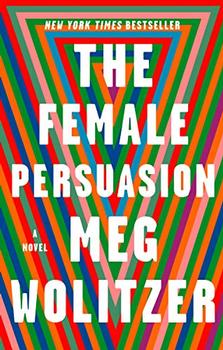Summary | Excerpt | Reading Guide | Reviews | Beyond the Book | Readalikes | Genres & Themes | Author Bio

A Novel
by Meg Wolitzer
How long would he watch his bouncing family? Greer wondered, and though she didn't miss her own parents at all—she was still angry with them for what they had done to her, which had resulted in her ending up at Ryland—she felt sorry for this boy. He was away from home on another continent, at a place that perhaps someone had mistakenly told him was a first rate American college, a center of learning and discovery, practically a School of Athens nestled on the East Coast of the US. After managing the complicated feat of getting here, he was now alone and quickly becoming aware that this place actually wasn't so great. And besides that, he was also pining for his family. She knew what it was like to miss someone, for she missed Cory so continually and pressingly that the feeling was like its own shattering bass vibrating through her, and he was only 110 miles away at Princeton, not across the world.
Greer's sympathies kept collecting and expanding, while in the doorway of the lounge appeared a very pale girl who stood clutching her midsection and asking, "Do either of you have something for diarrhea?"
"Sorry, no," said Greer, and the boy just shook his head.
The girl accepted their responses with a grim weariness, and then for lack of anything else to do she sat down too. Curling through the porous walls came the smell of dairy butter plus tertiary butylhydroquinone, seductive but inadequate to the task of cheering anyone up. Moments later this was followed by the source of the smell, a big plastic tub of popcorn conveyed by a girl in a robe and slippers. "I got the kind with movie theater butter," she said to them as an added inducement, holding out her bowl.
Apparently, Greer thought, these are going to be my people, tonight and perhaps every weekend night. It made no sense; she didn't belong with them, and yet she was among them, she was one of them. So she took a hand span's worth of popcorn, which was so wet that her fingers felt as if she'd draped them through soup. Greer was about to sit down and attempt a conversation; they could tell one another about themselves, how bleak they felt. She would stay in this lounge, even though Cory had encouraged her earlier on Skype not to stay in tonight, but to go out to a party or some sort of campus event. "There has to be something going on," he'd said. "Improv. There's always improv." It was her first weekend at college, and he thought she should just try.
But she'd said no, she didn't really want to try, she would rather get through it her own way. During the week she would be a super student, working in a carrel in the library, her head bent over a book like a jeweler with a loupe. Books were an antidepressant, a powerful SSRI. She'd always been one of those girls with socked feet tucked under her, her mouth slightly open in stunned, almost doped up concentration. All written words danced in a chain for her, creating corresponding images as clear as the boy from Iran's bouncing family. She had learned to read before kindergarten, when she'd suspected that her parents weren't all that interested in her. Then she'd kept going, plowing through children's books with their predictable anthropomorphism, heading eventually into the strange and beautiful formality of the nineteenth century, and pushing both backward and forward into histories of bloody wars, into discussions of God and godlessness. What she responded to most powerfully, sometimes even physically, were novels. Once Greer read Anna Karenina for such a long, unbroken bout that her eyes grew strained and bloodshot, and she had to lie in bed with a washcloth over them as if she herself were a literary heroine from the past. Novels had accompanied her throughout her childhood, that period of protracted isolation, and they would probably do so during whatever lay ahead in adulthood. Regardless of how bad it got at Ryland, she knew that at least she would be able to read there, because this was college, and reading was what you did.
Excerpted from The Female Persuasion by Meg Wolitzer. Copyright © 2018 by Meg Wolitzer. All rights reserved. No part of this excerpt may be reproduced or reprinted without permission in writing from the publisher.




Idealism increases in direct proportion to one's distance from the problem.
Click Here to find out who said this, as well as discovering other famous literary quotes!
Your guide toexceptional books
BookBrowse seeks out and recommends the best in contemporary fiction and nonfiction—books that not only engage and entertain but also deepen our understanding of ourselves and the world around us.